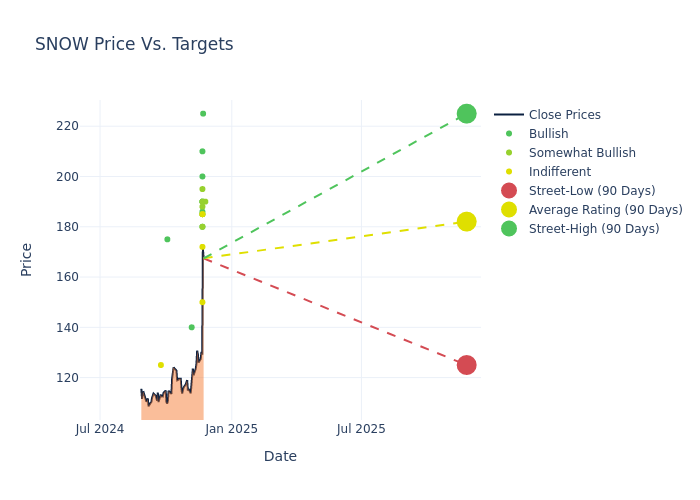
Across the recent three months, 25 analysts have shared their insights on Snowflake (NYSE:SNOW), expressing a variety of opinions spanning from bullish to bearish.
The following table provides a quick overview of their recent ratings, highlighting the changing sentiments over the past 30 days and comparing them to the preceding months.
| Bullish | Somewhat Bullish | Indifferent | Somewhat Bearish | Bearish | |
|---|---|---|---|---|---|
| Total Ratings | 12 | 8 | 5 | 0 | 0 |
| Last 30D | 0 | 1 | 0 | 0 | 0 |
| 1M Ago | 10 | 7 | 4 | 0 | 0 |
| 2M Ago | 2 | 0 | 0 | 0 | 0 |
| 3M Ago | 0 | 0 | 1 | 0 | 0 |
Analysts have set 12-month price targets for Snowflake, revealing an average target of $179.76, a high estimate of $225.00, and a low estimate of $125.00. Witnessing a positive shift, the current average has risen by 7.17% from the previous average price target of $167.74.

Exploring Analyst Ratings: An In-Depth Overview
In examining recent analyst actions, we gain insights into how financial experts perceive Snowflake. The following summary outlines key analysts, their recent evaluations, and adjustments to ratings and price targets.
| Analyst | Analyst Firm | Action Taken | Rating | Current Price Target | Prior Price Target |
|---|---|---|---|---|---|
| Daniel Ives | Wedbush | Announces | Outperform | $190.00 | - |
| Tyler Radke | Citigroup | Raises | Buy | $225.00 | $183.00 |
| Ki Bin Kim | Truist Securities | Maintains | Buy | $210.00 | $210.00 |
| Daniel Ives | Wedbush | Raises | Neutral | $160.00 | $130.00 |
| Gregg Moskowitz | Mizuho | Raises | Outperform | $195.00 | $165.00 |
| J. Derrick Wood | TD Cowen | Raises | Buy | $190.00 | $180.00 |
| Brad Zelnick | Deutsche Bank | Raises | Buy | $190.00 | $180.00 |
| Matthew Hedberg | RBC Capital | Raises | Outperform | $188.00 | $175.00 |
| Bradley Sills | B of A Securities | Raises | Neutral | $185.00 | $160.00 |
| Raimo Lenschow | Barclays | Raises | Equal-Weight | $172.00 | $142.00 |
| Ittai Kidron | Oppenheimer | Maintains | Outperform | $180.00 | $180.00 |
| Brent Thill | Jefferies | Raises | Buy | $180.00 | $145.00 |
| Michael Turrin | Wells Fargo | Raises | Equal-Weight | $150.00 | $125.00 |
| Kirk Materne | Evercore ISI Group | Raises | Outperform | $190.00 | $170.00 |
| Eric Heath | Keybanc | Raises | Overweight | $185.00 | $150.00 |
| Blair Abernethy | Rosenblatt | Raises | Buy | $186.00 | $180.00 |
| Mike Cikos | Needham | Raises | Buy | $200.00 | $160.00 |
| Brent Bracelin | Piper Sandler | Raises | Overweight | $185.00 | $165.00 |
| Blair Abernethy | Rosenblatt | Maintains | Buy | $180.00 | $180.00 |
| Tyler Radke | Citigroup | Lowers | Buy | $183.00 | $200.00 |
| Eric Heath | Keybanc | Lowers | Overweight | $150.00 | $168.00 |
| Brian White | Monness, Crespi, Hardt | Announces | Buy | $140.00 | - |
| Gil Luria | DA Davidson | Maintains | Buy | $175.00 | $175.00 |
| Blair Abernethy | Rosenblatt | Maintains | Buy | $180.00 | $180.00 |
| Karl Keirstead | UBS | Lowers | Neutral | $125.00 | $155.00 |
Key Insights:
- Action Taken: In response to dynamic market conditions and company performance, analysts update their recommendations. Whether they 'Maintain', 'Raise', or 'Lower' their stance, it signifies their reaction to recent developments related to Snowflake. This insight gives a snapshot of analysts' perspectives on the current state of the company.
- Rating: Analysts unravel qualitative evaluations for stocks, ranging from 'Outperform' to 'Underperform'. These ratings offer insights into expectations for the relative performance of Snowflake compared to the broader market.
- Price Targets: Understanding forecasts, analysts offer estimates for Snowflake's future value. Examining the current and prior targets provides insight into analysts' changing expectations.
Understanding these analyst evaluations alongside key financial indicators can offer valuable insights into Snowflake's market standing. Stay informed and make well-considered decisions with our Ratings Table.
Stay up to date on Snowflake analyst ratings.
Discovering Snowflake: A Closer Look
Founded in 2012, Snowflake is a data lake, warehousing, and sharing company that went public in 2020. To date, the company has over 3,000 customers, including nearly 30% of the Fortune 500. Snowflake's data lake stores unstructured and semistructured data that can then be used in analytics to create insights stored in its data warehouse. Snowflake's data sharing capability allows enterprises to buy and ingest data, while its data solutions can be hosted on various public clouds.
Snowflake: Delving into Financials
Market Capitalization: Boasting an elevated market capitalization, the company surpasses industry averages. This signals substantial size and strong market recognition.
Revenue Growth: Snowflake's remarkable performance in 3 months is evident. As of 31 October, 2024, the company achieved an impressive revenue growth rate of 8.43%. This signifies a substantial increase in the company's top-line earnings. When compared to others in the Information Technology sector, the company faces challenges, achieving a growth rate lower than the average among peers.
Net Margin: The company's net margin is below industry benchmarks, signaling potential difficulties in achieving strong profitability. With a net margin of -34.42%, the company may need to address challenges in effective cost control.
Return on Equity (ROE): Snowflake's ROE lags behind industry averages, suggesting challenges in maximizing returns on equity capital. With an ROE of -9.19%, the company may face hurdles in achieving optimal financial performance.
Return on Assets (ROA): Snowflake's ROA lags behind industry averages, suggesting challenges in maximizing returns from its assets. With an ROA of -4.28%, the company may face hurdles in achieving optimal financial performance.
Debt Management: Snowflake's debt-to-equity ratio is below the industry average. With a ratio of 0.89, the company relies less on debt financing, maintaining a healthier balance between debt and equity, which can be viewed positively by investors.
The Basics of Analyst Ratings
Benzinga tracks 150 analyst firms and reports on their stock expectations. Analysts typically arrive at their conclusions by predicting how much money a company will make in the future, usually the upcoming five years, and how risky or predictable that company's revenue streams are.
Analysts attend company conference calls and meetings, research company financial statements, and communicate with insiders to publish their ratings on stocks. Analysts typically rate each stock once per quarter or whenever the company has a major update.
Some analysts will also offer forecasts for metrics like growth estimates, earnings, and revenue to provide further guidance on stocks. Investors who use analyst ratings should note that this specialized advice comes from humans and may be subject to error.
Which Stocks Are Analysts Recommending Now?
Benzinga Edge gives you instant access to all major analyst upgrades, downgrades, and price targets. Sort by accuracy, upside potential, and more. Click here to stay ahead of the market.
This article was generated by Benzinga's automated content engine and reviewed by an editor.







